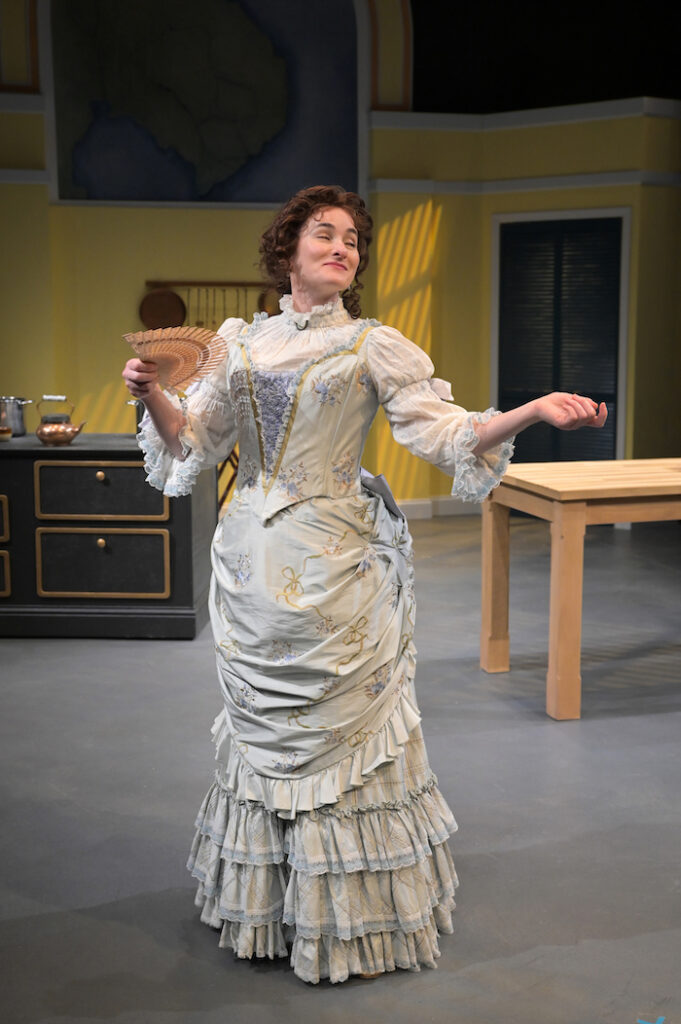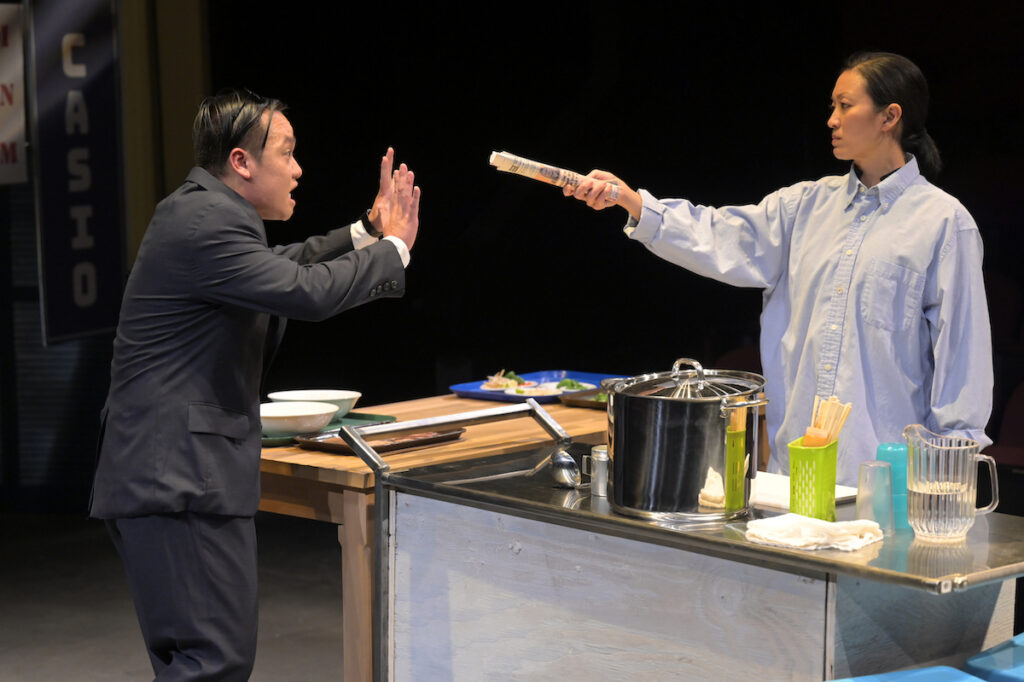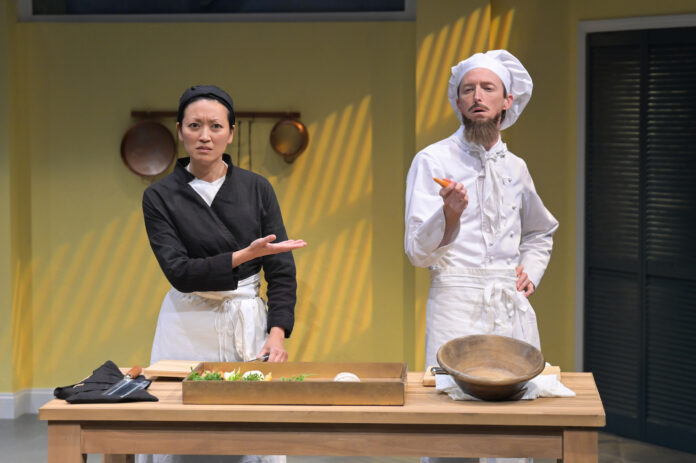Odd as it may seem, the most surprising part of Dustin H. Chinn’s Colonialism is Terrible, but Phở is Delicious (world premiere through December 4 at Aurora Theatre) is probably the part that passes the quickest.
It isn’t the sitcom-style portrayal of institutional racism, it isn’t presence of red lanterns hanging above we audience members, it isn’t even the sight of a French aristocrat fanning herself off beneath her skirt. No, it’s the sight of masks—COVID masks. As someone who’s spent the last two years documenting the presence of COVID protections, or the lack thereof, in theatre, seeing two in-story characters in masks was so unexpected that I nearly dropped my notepad (and my Aranet4, which would top 1814ppm by the end of the night).
Not that I’m complaining—quite the contrary, I wish the still-ongoing pandemic got more than just that passing visual reference. In a play about anti-Asian racism, even one played mostly for laughs, a nod to the odious “Chinese virus” hate campaign would’ve fit in all too well. And since AD Josh Costello’s curtain speech mentioned that Chinn was rewriting as recently that afternoon, perhaps the pandemic may yet get a more prominent nod.
As it stands, Chinn’s script packs a lot into its 90-or-so-minute runtime. Under the direction of Oánh Nguyễn, the story jumps around in time to hypothesize the history and ubiquity of its titular Vietnamese noodle dish. Particularly, Chinn’s script uses phở as an avatar for the Viêt people themselves as Western influence (particularly French and American) strips them of the ability to craft their own identities, even as their traditions are assimilated. What’s more, Chinn chooses three time periods that are more or less innocuous, given the country’s tumultuous history.

We begin in “French Indochina” of 1889, where renowned chef Guillame (Joseph Patrick O’Malley) serves at the estate of the pompous Madame Gagnier (Elissa Beth Stebbins). As Guillame will be leaving Madame’s service soon, he enlists the help of her servant Nguyên (Anthony Doan) to find a local chef as a successor. Madame —who refers to Nguyên as “nougat” before informally renaming him “Etienne”—scoffs at the very notion of one of the conquered local farmers producing anything worthy of her Parisian palate. Guillame and Nguyên are almost as doubtful about giving the role to tempestuous local chef Thúy (Nicole Tung).
We then hop 110 years ahead to a pre-Y2K Viêt Nam. Native Mùi (Tung) operates a phở cart in what-used-to-be Saigon. One day, her Capitalist brother Quang (Doan) shows up with two sore-thumb yanks (O’Malley and Stebbins) who say they want to try a “real” local dish. Of course, it takes them a little while to explain exactly why they’re on the lookout for local food, something that doesn’t sit well with the suspicious Mùi.
We finish our journey in present-day Brooklyn, gentrified home to the $20 culinary monstrosity known as the cronut. This is the COVID-era time in which we find millennial friends Danielle (Tung) and Julie (Stebbins) sitting down for a meal at a bougie “phở fusion” restaurant. Danielle being of Viêt descent, she has some very strong opinions about the right and wrong way to eat phở, something that doesn’t sit well waiter Sam (Doan), nor with the Cordon Bleu-trained chef (O’Malley) who cooked it himself.

At the start of the play, we’re shown a text projection explaining that dialogue intended to be Viêt is spoken as Standard American English, with all others represented through exaggerated accents. I was reminded of Mia Chung’s You for Me for You (the Bay Area premiere of which also starred Elissa Beth Stebbins), which took a similar approach with Korean and English. I also recalled when a Viêt-descended colleague pointed out to me that country’s “native” language is all but dead, and that the modern language is based entirely around the Western alphabet. That’s the thing about colonialism and gentrification: They want no other history but their own.
By happenstance, I came home from the show to see the final episode of Atlanta, for which the plot point of a Black-owned sushi joint across the street from a Popeye’s raises questions about assimilation that our main quartet aren’t ready to answer. That’s the opposite of the three characters played by Tung (whose work I don’t recall, but she’s a powerful presence here): In every time period, she’s the one resistant to whatever change is being promoted by Doan’s characters. She sees it as nothing more than selling out; he’s proud of the fact that they can sell at such a high price.

The European colonizers played by O’Malley and Stebbins (the latter of whom brings her usual high skill to her roles) reminded me of Keith Hennessy’s pre-show anecdote about a young queer techie buying Castro real estate, but pushing out queer elders. In both cases, the colonizers seriously believe their presence is a boon to the historical area, which makes the damage they do to it all the more painful.
And yet, the endings to both this play and the Atlanta episode (neither of which I will spoil here) reach a similar culinary conclusion about the colonized having their own culture sold back to them at marked up prices. If it were as simple as not patronizing a business, then boycotts would carry a lot more weight these days. Yet, I know plenty of fellow Black queers who go to Chick-fil-A (I never have and never will). Finding the middle ground between the world we want and the world we know isn’t always as easy as adding sauce to your bowl of noodles.
To Chinn’s credit, he does well at skewering classic colonialism and “basic bitch” milquetoast culture that strips everything of its unique traits. Very rarely does his dialogue stumble into the overly expository, as it mostly pumps with righteous (and hilarious) anger of being a marginalized person reduced to a menu item. Director Nguyễn and his collaborators make a brisk evening out of the sort of story that is, thankfully, getting more portrayals of late.
I think a further mention of COVID would have only improved the present day scene, but that very scene gets mileage out of not wanting to compromise on your favorite ingredients.
COLONIALISM IS TERRIBLE, BUT PHỞ IS DELICIOUS has its world premiere run through December 4 at Aurora Theatre, Berkeley. Tickets and information here.







